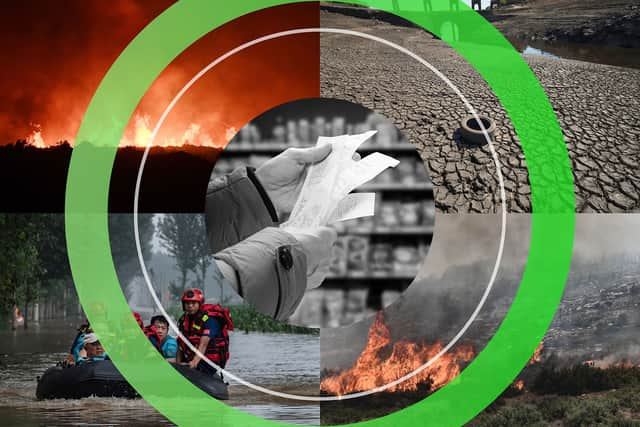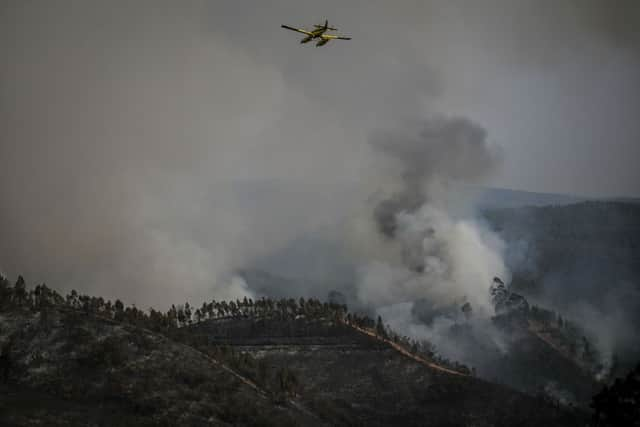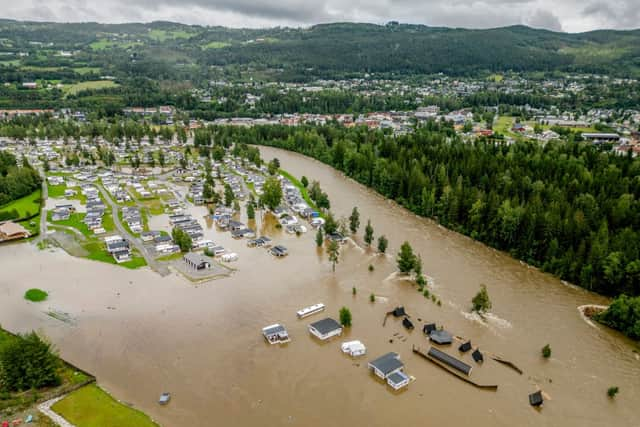Cost of living crisis: What impact is climate change having on food inflation and grocery prices?
This article contains affiliate links. We may earn a small commission on items purchased through this article, but that does not affect our editorial judgement.
and live on Freeview channel 276
Britons are battling twin crises as the cost of living crisis and the climate crisis both show their teeth - but prices creeping up at the supermarket till is linked more closely to rising temperatures than some may realise.
Britain's era of cheap food is over, economists have told The Telegraph, with the Bank of England warning grocery price inflation will remain in double digits until at least the end of this year.
Advertisement
Hide AdAdvertisement
Hide AdThis comes as July broke the record for the hottest month ever, according to the Copernicus Climate Change Service, with Southern Europe and Northern Africa baking in back-to-back heatwaves and record-breaking temperatures.
With climate change bringing droughts, devastating wildfires like the one in Greece, and more frequent and severe flooding, it is beyond question it will impact farmers across the globe - and the UK's food supply.
But how does this affect prices at the grocery story? Here's everything you need to know:


Droughts and extreme heat
Extremely high temperatures, like those recently seen in Europe, and droughts - or an extended period with below-average rainfall for that time of year - can both have a big impact on an enormous variety of crops.
Advertisement
Hide AdAdvertisement
Hide AdBack in April - a key food-growing period - roughly 60% of the Spanish countryside was gripped by drought. The main Spanish farmers' association said crops like wheat and barley were likely to fail entirely in four different regions, while long periods without rain put water-intensive nuts and vineyards at risk.
The lack of water also saw water levels in the reservoirs of Andalusia fall to just 30% of their capacity, affecting farmers’ ability to irrigate corn, sunflowers, and rice - meaning less of those crops were sown over the summer.
They struggled to feed cows on dried-up pasture, PA reported, and beekeepers saw a third consecutive year without honey when their bees could not find enough flowers to feed from.
According to the UK government, just under half of the actual food on British plates is produced in the UK - largely grains, meat, dairy, and eggs. This means prolonged droughts and high temperatures in countries like Spain and Italy drive up food prices here, as these regions are where a lot of our fruit and vegetables come from.
Advertisement
Hide AdAdvertisement
Hide AdProducts which might be affected by last month's back-to-back heatwaves and record temperatures could include tomatoes - and tomato-based ketchup, pizza and pasta sauces - and salad leaves, i News reported.


Wildfires
Hotter, drier summers mean that the risk of wildfires - as well as the risk of them spreading out of control as they burn through tinder-dry vegetation - is higher.
These can cause substantial crop losses to farmers in affected areas, but even more so for farmers who rely on slow-growing trees to produce food. Olive trees, for example, a key crop across the Mediterranean region, only start growing fruit when they are between three and five years old.
Much of the region has been devastated by wildfires this summer, and it's putting Greece and Italy's olive oil farmers at risk. Growers in Calabria told the BBC last week that the trees were "like a natural bomb", because they were full of oil, and burned very quickly. The wildfires had created an "emergency" in his region, that has forced dozens of farmers to band together and fight the fires themselves - or risk losing their livelihoods.
Advertisement
Hide AdAdvertisement
Hide AdEurope - especially Spain and the Mediterranean countries - produce about 70% of the world's olive oil. But the problem is not limited to olives - any tree-borne fruit or nut could be equally affected - with other recent examples including avocados and lemons.
Flooding
At the opposite end of the spectrum, extremely high rainfall - and the flooding it can cause - can also have a devastating impact on food production.
Climate change has increased the frequency and severity of heavy rain events and subsequent floods - and it still comes down to temperature. Warmer air sucks up and holds more water which will eventually fall somewhere as rain, the Met Office says, while a similar process playing out over warmer seas can produce severe storms - like cyclones.


Rain and flooding can impact food production in a number of ways, from destroying crops - grown to feed both humans and livestock - over a wide area, to destroying equipment needed to harvest them, to making once-fertile land unsuitable for farming by washing layers of sediment over it.
Advertisement
Hide AdAdvertisement
Hide AdA recent example was the 2019 Yorkshire Dales floods. Above-average rainfall over Northern England caused flash-flooding. The affected area is where a good chunk of the UK's potato crops are grown, as well as its brassicas - like cauliflowers and cabbages.
The Guardian reported the flooding left as much as 10% of that year's potato crop rotting in the ground due to all of the standing water - with analysists saying the price of potato products like crisps and chips would rise in the new year as a result.
So why do these things increase food prices?
Simply put, while demand for products like potatoes and olives stays the same, climate impacts mean that the supply is reduced.
This means that the food supply chain - and supermarkets - will usually have to pay more if they want to stock this produce - and other items made from them like crisps and olive oil - leading to consumers paying more at the till.
Advertisement
Hide AdAdvertisement
Hide AdClimate change is already playing a part in driving up food prices, with a paper released this year by the European Central Bank examining the issue finding that the summer of 2022's extreme heat in Europe increased food inflation by nearly 0.7 percentage points.
Without "historically unprecedented adaptation", global warming could drive up annual food inflation between 0.9 and 3.2 percentage points each year that the temperatures reached - or exceeded - those currently projected for 2035, it warned.
For the average shopper around the world, it plays into the increase they are already seeing in their grocery bills. The latest food inflation stat was 17.3% overall in the UK as of June 2023 according to the Office for National Statistics (ONS). So, in practice, something that cost £1 a year ago now costs £1.17 on average.
An extra 3.2 percentage points of top of that would make it cost £1.21 instead.
Advertisement
Hide AdAdvertisement
Hide AdWhat can we do about it?
The National Farmers Union (NFU) is pushing for the UK to produce more of its own produce to increase its food security, saying that global instability caused by the ongoing Ukraine war and the recent bouts of extreme weather have both highlighted the frailties of the UK’s food system.
“I have never known such volatility in the global food system," NFU President Minette Batters said. "Climate change is wreaking havoc on food production across the world, with farmers in Southern Europe literally fighting fires while farmers here are despairing as they now must spend thousands of pounds to dry sodden grain."
The group has called for the government to ensure policies are in place to support the production of quality, climate friendly, home-grown food now, so the UK is able to "produce more of our own food at home, regardless of what else is going on in the world".
However, scientists say we need to urgently cut back our greenhouse gas emissions - particularly by reducing our reliance on fossil fuels - to curb global average temperature increases, and their impacts.
Advertisement
Hide AdAdvertisement
Hide AdThe World Meteorological Organization’s secretary general, Professor Petteri Taalas, said: "The extreme weather which has affected many millions of people in July is unfortunately the harsh reality of climate change and a foretaste of the future."
“The need to reduce greenhouse gas emissions is more urgent than ever before. Climate action is not a luxury but a must," he added.
Comment Guidelines
National World encourages reader discussion on our stories. User feedback, insights and back-and-forth exchanges add a rich layer of context to reporting. Please review our Community Guidelines before commenting.
